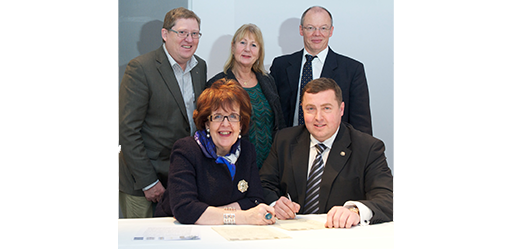
Top row left to right - Mats Arnsmar (Gothenburg City Council), Kia Andreasson (Gothenburg Deputy Mayor)), Krist Poffyn (Ghent City Council) Bottom row - Bailie Elizabeth Cameron (Glasgow City Council) Vjaceslavs Stepanenko (Riga City Council)

Top row left to right - Mats Arnsmar (Gothenburg City Council), Kia Andreasson (Gothenburg Deputy Mayor)), Krist Poffyn (Ghent City Council) Bottom row - Bailie Elizabeth Cameron (Glasgow City Council) Vjaceslavs Stepanenko (Riga City Council)
Glasgow’s growing global reputation for excellence in low carbon energy has been boosted after influential leaders from across Europe met in the city to kick off a major project.
Richard Bellingham of the Fraser of Allander Institute is the European coordinator of the programme. The STEP-UP programme, led by Strathclyde, brought together delegates from partner cities to set out the plan to reduce carbon emissions by at least 20% by 2020 and aid the Europe Union’s 2020 energy targets for improved energy efficiency, growth of renewable energy and carbon emissions reduction.
Representatives from Glasgow City Council, ScottishPower and the University of Strathclyde joined with the ambitious northern European cities of Gothenburg, Ghent and Riga to take part in the two-day conference.
The cities signed a formal agreement committing them to work together to become global leaders in sustainable urban development.
Richard Bellingham, Deputy Director of the Fraser of Allander Institute, is European coordinator for the project. He said, “This event is the first step of a leading research programme that demonstrates the strength and quality of our European partnerships, and our commitment to delivering tangible benefits for people and businesses in cities across Europe.
“Sustainability is about making a real and relevant difference in people’s lives; making our cities better places to live, work, learn and invest.
“Strathclyde, as a leading international technological university, has a growing global reputation for innovation in energy. The international partnerships we are developing through STEP-UP will help shape the future for urban energy planning - helping industry, government and citizens across Europe meet the major energy challenges that lie ahead.”
Bailie Liz Cameron of Glasgow City Council said, “Cities like Glasgow and its partners bring together education, innovation, communities and investment in ways which would otherwise be impossible. They are the crucibles in which new ideas and progress are forged.
“We are committed to ongoing and ambitious goals for environmental improvement and sustainable development and, together, we have potential to deliver not only a better environment, but a more sustainable economy and a fairer society.
“As Glasgow bids to be Europe’s Green Capital in 2015, we want to learn from each other and inspire other cities to do the same.”
George Kirk, Smart Cities Director at ScottishPower Energy Networks, added, “ScottishPower Energy Networks is excited to be part of this collaboration, and we are sure that there will be much to learn from each of the cities and partners involved. The ambition to have smarter, low-carbon energy networks is shared globally, and this project will encourage best practice to be shared internationally.
“The University of Strathclyde is at the cutting edge of low carbon energy developments, and we are pleased to be expanding our long-standing relationship with them. We also have a good working relationship with Glasgow City Council through Sustainable Glasgow and we hope to bring real benefit to the City through this collaboration, using best practice from across Europe.”
The conference was held in the city’s Trades Halls and The Lighthouse, with a visit to the Commonwealth Games Village - focusing on the redevelopment of the area and the Games legacy to bolster the local economy and improve Glasgow’s reputation as a place to visit and conduct business.
Coordination of the project, the enhancement of city energy plans, development of innovative projects and supporting a learning network of cities was the focus of the conference as the partners aim to achieve ambitious EU targets.
Funding for STEP-UP was obtained through the EU’s Seventh Framework Programme (FP7) following a Europe-wide competition. FP7 supports the European Union’s strategy to become the most dynamic competitive knowledge-based economy in the world. Fundamental to that strategy is research, education and innovation.
The STEP-UP project is closely linked to Sustainable Glasgow, a city-wide partnership formed to help Glasgow become one of the most sustainable cities in Europe – and one of the best places to live and work. It brings together partners from higher education, the public and private sectors to work with local people, communities and businesses.
Additional support from the Scottish Cities Alliance will expand the impact of the project to all Scotland’s cities after £50,000 was committed from the Cities Investment Fund. The alliance aims to attract investment, create jobs and help Scotland's cities compete more successfully on the international stage.